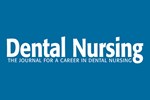
All Clinical


Dental trauma in children. Part 1: causes and assessment
Dental nurses are often required to carry out initial assessment and triage of patients who attend the dental clinic on an emergency basis. This article, the first in a series of two articles, covers the causes and classifications of dental trauma as well as the principles of history taking

Credit where credit is due
Fiona Grist, vice president of the Orthodontic National Group for Dental Nurses and Therapists, and a member of Dental Nursing’s editorial board, highlights two dental nurse winners at the BOS annual conference and the British Dental Assocation awards dinner respectively

Mouth ulcers and halitosis: causes and management
Patients often contact dental care professionals because they are experiencing mouth ulcers and halitosis. There are several causes for these common, distressing conditions, and dental nurses can provide advice and treatment to tackle them

Non-surgical management of dental caries

Why interdental cleaning is still vital
Interdental cleaning has been in the news recently, and not all of it made for sparkling reading. Karen Coates, oral health advisor at the British Dental Health Foundation, discusses the importance of reminding patients about a key aspect of oral hygiene maintenance

Dealing with teething in children
It is commonly believed that teething in infants can cause various signs and symptoms. This article reviews the evidence for the various suggested signs and symptoms as well as suggested remedies

Throat cancer: symptoms, risks and management
Mouth and throat cancers are becoming more common, and members of the dental team should be able to detect the warning signs, refer patients appropriately and advise them on how to prevent it

The care and maintenance of dental implants
The success of dental implants depends on a number of factors. A major reason for their failure is peri-implant disease. Careful management and advice before, during and after the implant has been fitted can minimise the risk of this and treat problems where it does occur

Dental anxiety: How CBT might help support anxious patients
Cognitive behavioural therapy (CBT) suggests that how someone thinks, affects how they feel and behave. This article provides a brief introduction to CBT and proposes how it might be used in practice to support anxious patients and improve their dental experience

Dry mouth management in palliative and cancer care
Dry mouth is common after treatment for cancer and can affect patients' quality of life and oral health. Advice and management strategies can help minimise the distressing effects of this condition following radiotherapy and chemotherapy and during end-of-life care

Understanding the importance of patients' medical histories
The dental team has a responsibility more than ever in managing patients and providing them with the best possible dental care. We must always be aware of the futility of providing a patient with a fantastic ‘Hollywood smile’ when the dental team have missed obvious signs of a sinister medical probl

Nurse–child interaction during fluoride varnish application
Zhou Y, Forbes GM, Macpherson LMD, Ball GE, Humphris GM (2012) The behaviour of extended duties dental nurses and the acceptance of fluoride varnish application in preschool children. Br Dent J213: 603–9

Lip augmentation: the role of the dental nurse
Lip-enhancing procedures are becoming increasingly popular in dental practice, and dental nurses can advise patients on procedures and their results. A basic knowledge of lip augmentation will enable nurses to manage patients’ expectations and answer their questions

To prophy or not to prophy? That is the question
Prophylaxis; it means prevention or at least preventative. We apply the term to the polish that we use to finish the scale and, as the term suggests, polish. What is it and why do we use it? Indeed the question can be raised should we be using it at all when it can be damaging to the hard tissues of









